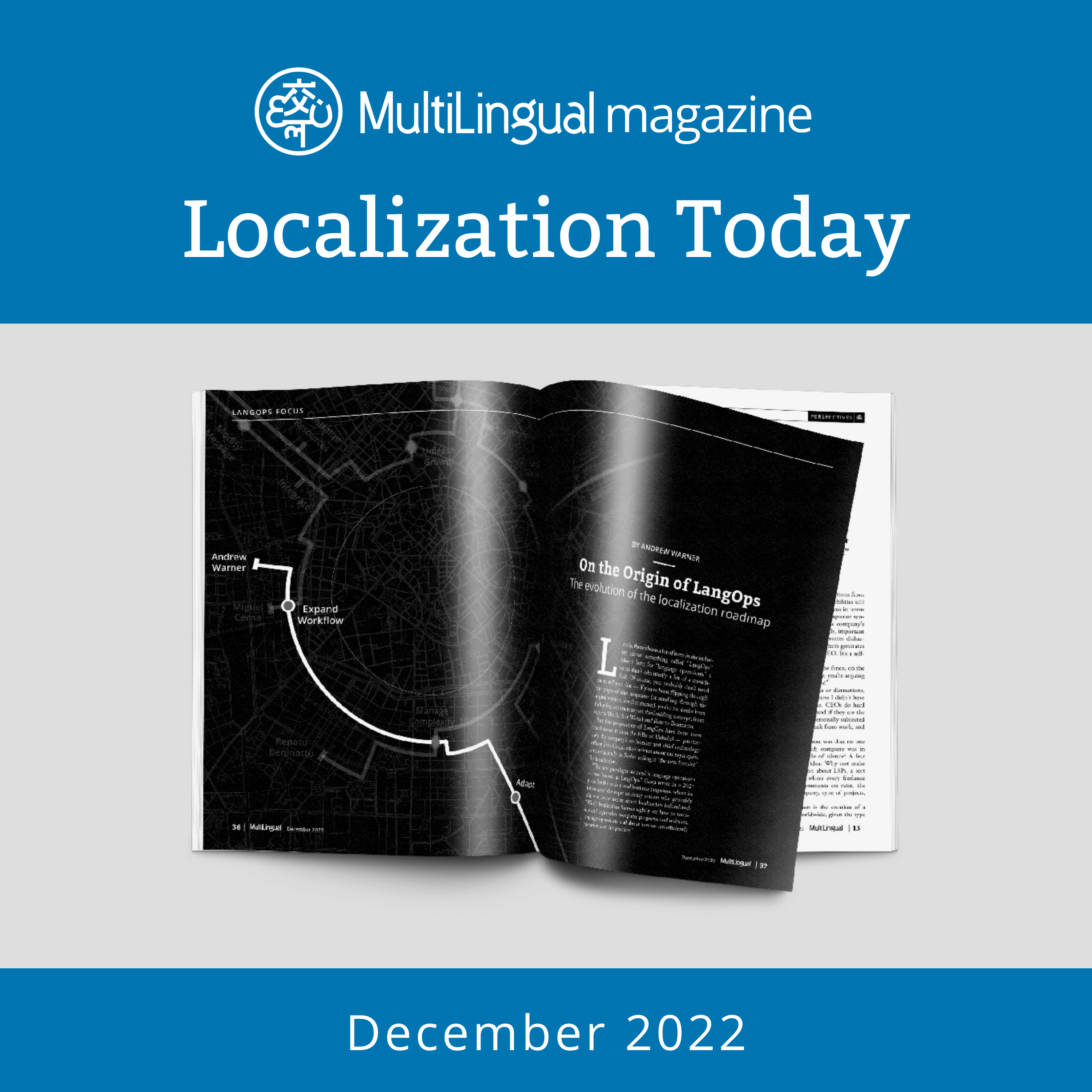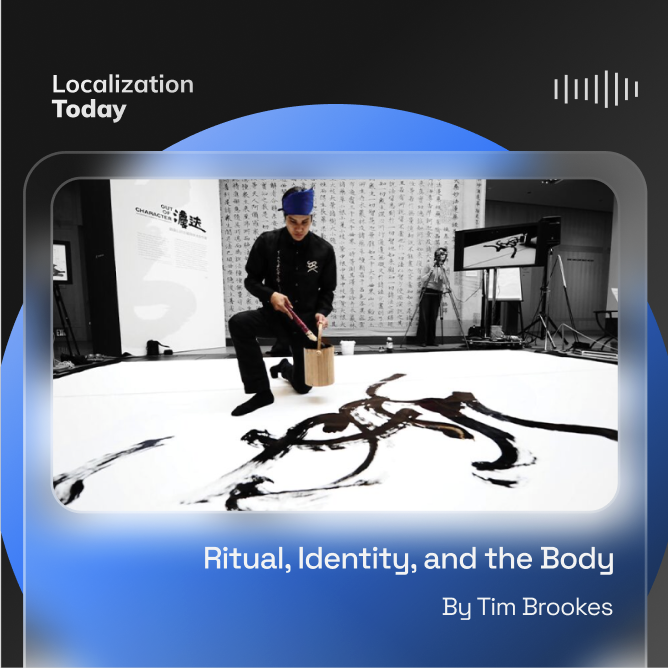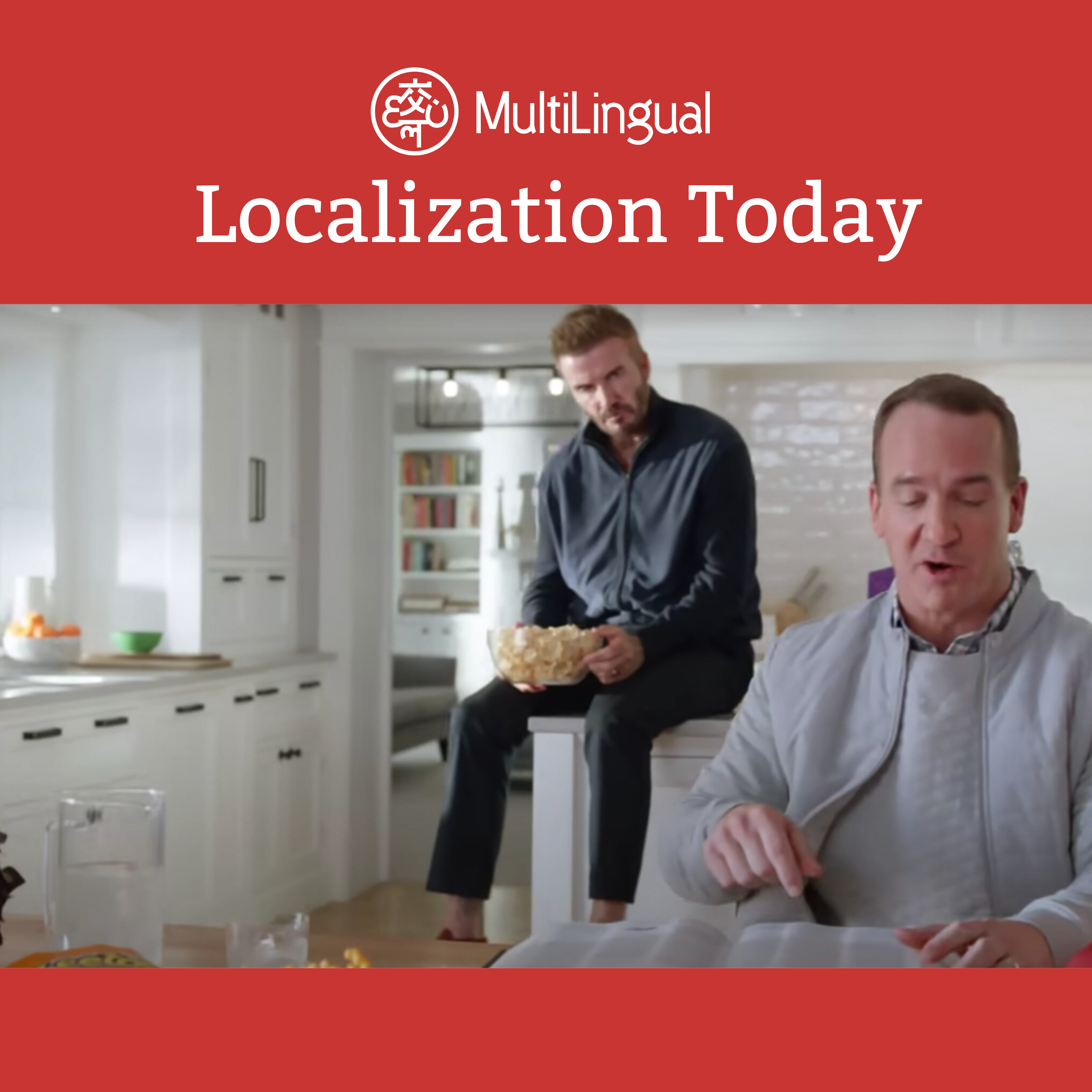Episode Transcript
[00:00:00] Speaker A: Martina Russo Speaking the Language of Action Sports Interview by Cameron Rasmussen Martina Russo was never one to shy away from a challenge embracing the exciting world of outdoor and action sports from a young age. Her life is oriented around the next route to climb, the next powder line to chase, or the next trail to bike. It's an attitude that applies to her professional life. Two Drawn to translation and localization as a vocation, she eventually combined her two passions into a specialized localization agency for action sports brands, the Action Sports Translator.
Serving some of the biggest brands in the outdoor sports world, Russo and her team strive to ensure their clients speak authentic lingo regardless of regional differences. After all, when lives can depend on choosing the right gear and following accurate instructions, quality counts. And since task team members themselves use and rely on their clients products, accuracy is as natural as the environments they love. Exploring.
You're an entrepreneur who managed to combine two distinct passions into one business model. How did you develop interests in both language and action sports? And how did you find your way into the language industry?
[00:01:18] Speaker B: Growing up in Milan, just a couple of hours from the Alps, I'm lucky that my parents put me on skis when I was barely three years old, so I basically learned to ski before I could properly talk. The mountains quickly became my escape and safe haven, and even after my family stopped going, I kept finding my way back. At age 16, I strapped on a snowboard for the first time and never looked back. Sports were always a constant. I spent years in athletics and swimming, but it was in the mountains where I really felt at home.
At the same time, I was fascinated by languages and cultures, so I left Italy to work in Germany as soon as I turned 19.
Later, I returned to Milan to study translation and interpreting while working at an airport and a cinema cafe to pay for my classes and make ends meet, I immediately started freelancing during my first year of university in between juggling airport shifts. Not long after, I packed my bags again and spent years living across South America, Southeast Asia, and other parts of Western and Eastern Europe. I continued working on my degree remotely while starting to rely entirely on my freelance translation projects to sustain myself, which I gradually turned into a successful business.
Along the way, I tried my hand at new outdoor sports. Kite surfing. Surfing, trail running while climbing, and later mountain biking became my main ones alongside snowboarding. As I was constantly immersed in outdoor communities and culture, I kept noticing the same issue whenever I interacted with a brand in a language other than English. The experience was just broken. I'd run into gear described with completely wrong terminology instructions that left me more confused than informed and product pages that just didn't speak the way outdoor people actually talk. And I knew millions of outdoor consumers were going through the same thing. By then I already had nearly a decade of experience in translation. I I'd been freelancing since 2010 and had also founded another agency specializing in software as a service SaaS localization.
So I started wondering, why not do something about it? Then one day I was recovering from a foot surgery and couldn't climb, hike, or snowboard. Stuck at home with time to spare, I pulled together a team, built a website, chose a name, and launched the business. As they say, the rest is history.
[00:03:30] Speaker A: What gaps did you see for sports enthusiasts that more broadly focused agencies weren't filling before launching?
[00:03:37] Speaker B: Tasked, I realized there was no one on the market focused solely on the outdoor industry at scale. The large agencies that claim to cover every sector simply can't address the specific challenges outdoor brands face, as this is a space that runs on its own culture, language and communities.
It's common knowledge that many agencies rely on generic pools of translators with no sports expertise, automated job assignment systems that provide little to no context, and one size fits all workflows designed to maximize efficiency without preserving authenticity, which is absolutely key in this industry. So I saw the opportunity to build something completely different, a setup where projects are matched with specialists who actually practice the sports they translate about, where linguists are given full context instead of working blind, and where workflows are designed around the mix of technical detail and creative storytelling outdoor brands need. It's an agency made up of people who live and breathe the outdoors, working with the very brands we rely on every day in our own adventures?
[00:04:35] Speaker A: What are the challenges and concerns unique to action sports brands, and what are the implications if localized materials aren't sufficient for customer needs?
[00:04:45] Speaker B: When you think of action and outdoor sports, you might picture a niche, but in reality it's a macro niche made up of dozens of sports, each with their own subverticals. Surfing, mountain biking, skiing, and skateboarding all fall under the umbrella of action and outdoor sports, yet each one has a drastically different culture, style and language. Take climbing. You have bouldering, traditional climbing, sport climbing, single and multi pitch, alpine climbing, and ice climbing. Each is almost a separate discipline with its own mindset, gear and vocabulary. Cycling is another good example.
People often imagine road cycling first, but the sport also includes gravel track, cyclocross, BMX and mountain biking. And within those you've got even more subverticals and subcultures, each with its own slang and identity. So when you're translating, it's not enough to simply adapt copy into your own language and target culture. You also have to reflect the very specific sports culture, the channels the content will appear on, and the geographical and societal background of the audience.
A phrase like make the mountains your weekend playground might resonate with a skier in the Italian or French Alps, but it won't mean much to a Dutch audience where the highest peak barely reaches 300 meters. Add to that the fact that terminology poses very specific challenges, and in some cases, getting it wrong doesn't just break trust, it can put people at risk. Authenticity is everything in the outdoor industry, and unlike other sectors, you can't fake your way through it. You either know the sports you're translating about firsthand or your work will immediately sound off to the people who do.
[00:06:23] Speaker A: What technology do you use to deliver translations suited for action sports? What are the unique considerations that the industry demands and how did you shape your workflows to meet them?
[00:06:34] Speaker B: We are platform agnostic, depending on client needs, but we run most of our localization operations through a central translation management system, tms. This is connected to our clients tech stacks as well as the platforms we use internally for project management, business operations and content delivery through application programming interfaces, APIs and ready made connectors. When it comes to action and outdoor sports specifically, it's a mix of retail and E commerce needs, pay per click, PPC and search engine optimization, SEO creative spanning from video campaigns to in shop, print and digital assets, full feature films, social media content, legal documentation, manuals and more.
As such, we have to design and deploy very specific and customized workflows across our platforms, leveraging advanced technology to automate as much as possible while keeping the very granular need for customization in mind.
[00:07:26] Speaker A: You also offer content creation and AI integration services.
Could you tell us about those offerings and how action sports brands utilize them?
[00:07:35] Speaker B: While we started out as a translation agency, many of our clients quickly asked us to support them with content creation as well, as we now have a dedicated department for brand and product copywriting and SEO blog content writing. A good chunk of our work is around seasonal product copy and SEO articles, though we also do a fair bit of campaign slogans, newsletters and other marketing copy. Sometimes we work from client briefs and keyword lists, while other times we create the strategy ourselves. The key is that our copywriters are professionals who also live the sports they write about, which makes the content sound credible and authentic again rather than generic. When we talk about AI integration, we mean implementing AI in translation and content workflows for the companies we work with. Many of the brands we support are under pressure from management to streamline how they work, but they don't always know where to start, especially when there isn't one person owning the copy or translation function. So we step in to help them understand what AI can realistically deliver and where it makes sense to apply it without compromising brand voice. For example, when a brand moves to a new content management system, CMS or E commerce platform with built in AI features, it's easy to hip, generate and populate hundreds of product descriptions. But without a clear strategy covering aspects like terminology management, style guide alignment, content governance and quality assurance qa, the results are rarely fit for market. Instead, we work with clients to build AI assisted workflows that are actually usable, from training the AI on their tone of voice and brand terminology to integrating with their TMS or CMS through custom connectors, setting up review layers for high impact content and measuring outcomes in terms of both cost and time to market.
[00:09:16] Speaker A: Your entire team consists of outdoor enthusiasts with an understanding of action sports products, equipment and services. How does that familiarity and expertise improve localization quality?
[00:09:29] Speaker B: It makes a huge difference.
If you've never clipped into a pair of touring bindings, tuned a mountain bike suspension or packed for a multi day trail run, the terminology and context will feel abstract. There's only so much you can get from research because not everything is well documented or has a clear equivalent in another language.
To get it right, you need to truly understand how these products are built, why they're designed the way they are, what they feel like in use and and who they're made for. For our clients, that expertise means fewer rounds of corrections, less time spent clarifying product details and content that resonates with their audience. From the start. It's the difference between sounding like an insider and sounding like someone who just googled the sport.
[00:10:10] Speaker A: What is it like to work with some of the companies you've patronized all your life? And how did you attract them and keep them coming back for more when.
[00:10:18] Speaker B: It comes to attracting and keeping brands? At the risk of repeating myself, it all starts with authenticity. If you're not part of this world, it's hard to connect with the industry in a meaningful way. Our entire team, from core staff to freelancers, lives and breathes the sports we work on and that's what allows us to build genuine relationships right from the start. But of course, that's not the whole story.
Tasked is unique because we work like a hyper specialized in house team agile rooted in the culture but also leveraging some of the most advanced technology on the market.
That combination gives us the flexibility to adapt quickly while also meeting the complex needs of large outdoor brands. We put a lot into every relationship in every project, making sure our service is personal and the work we deliver actually solves the challenges our clients bring to us On a personal level. And I know I speak for our whole team, Supporting these brands is an incredible feeling. When I'm climbing, biking, skiing, or just spending time outdoors, there isn't a single day I don't see people using products from the brands we work with.
Most of the time I'm using them myself. That always makes me proud, although I'll admit it can also make it harder to switch off from work. Still, it's a constant reminder of why I do this and why it matters.
[00:11:30] Speaker A: It's worth noting that the action sports community is uniquely international in nature. For instance, the expeditions formed by multinational team members to conquer challenges in the world's most remote areas. How does that international dynamic play into the work you do?
[00:11:47] Speaker B: You are right. Many outdoor sports are inherently international.
Take kite surfing, surfing, skiing and climbing. I love going to the Crag and hearing climbers speak 10 different languages. And you see the same at events like the Ultra Trail du Mont Blanc, U TMB Trail Running series, the International Federation of Sport Climbing, I FSC World cup climbing competitions, and global surf contests, to name a few. Huge gatherings where athletes, fans and brands from every corner of the world come together. Outdoor and action sports are also tied to geography. Surf brands thrive where there's surf culture like Hawaii, Portugal or Australia.
Snowboarding naturally grows in the Alps, the Rockies, and Japan. Road cycling is strongest in places with the right mix of terrain, infrastructure and history, like Italy, France, Spain, and the United Kingdom. These communities in turn shape a brand's go to market strategy because without a local community, there's no real market.
A snowboard brand in Portugal might find a niche, but in the Alps it's mainstream. And once a brand decides where to grow, localization is what reinforces those community ties. By communicating in the local language with the right terminology and tone, that's where we come in. We make sure brands can speak to their global community in a way that still feels true and connected. Whether someone's skiing in Japan, surfing in Spain, or standing at the start line of a trail running competition in Kamenix.
[00:13:11] Speaker A: Could you tell us about your own experiences in action sports? What are some of the most exciting challenges and adventures you've tackled over the years?
[00:13:20] Speaker B: Outdoor sports aren't really a hobby for me, they're central to my entire life. I intentionally spend a few months at a time in different regions and rotate between outdoor sports hotspots throughout the year, depending on the season and the discipline I'm focused on, all while running the company remotely. In winter you might find me in Austria or Switzerland snowboarding on powder or or in Greece and Spain climbing limestone in perfect conditions.
Summer is for mountain biking in France or Switzerland, kite surfing in Portugal or climbing in northern Spain. You get the gist.
Moving with the seasons means I get to properly immerse myself in each sport and its community. Because of that, it's hard to pick just one adventure to highlight. I try to spend all of my free time outdoors, so every day can be a big or small one. The ones that stick out the most are the Type two fun outings, the kind that feel miserable in the moment and make you question your life choices but become your best stories afterwards.
Like the time I went on an electric mountain bike tour alone in an area I didn't know, following a Wicklock track that was supposed to be a mountain bike trail but turned into a technical hiking path. I ended up pushing and pulling the 26.5 kilogram heavy bike over electrified cow fences and massive rocks while the clouds rolled in.
Rain started falling, the temperature dropped and the sun began to set.
Seven hours and 45 kilometers later, I barely made it back, exhausted and frozen, but having pushed through terrain I never thought I could handle it. Definitely taught me a few lessons about planning. Oops.
[00:14:51] Speaker A: Anything else you want to add for.
[00:14:53] Speaker B: Anyone interested in following along? You can find more information about our company on our LinkedIn and Instagram pages. I also share about my personal and professional adventures on my Instagram feed and LinkedIn profile.
And if you're a translator or copywriter who has a genuine passion for outdoor sports, feel free to reach out via our Career page.
[00:15:13] Speaker A: This article was written by Cameron Rasmussen. He is a senior writer and editor for Multilingual Media.


